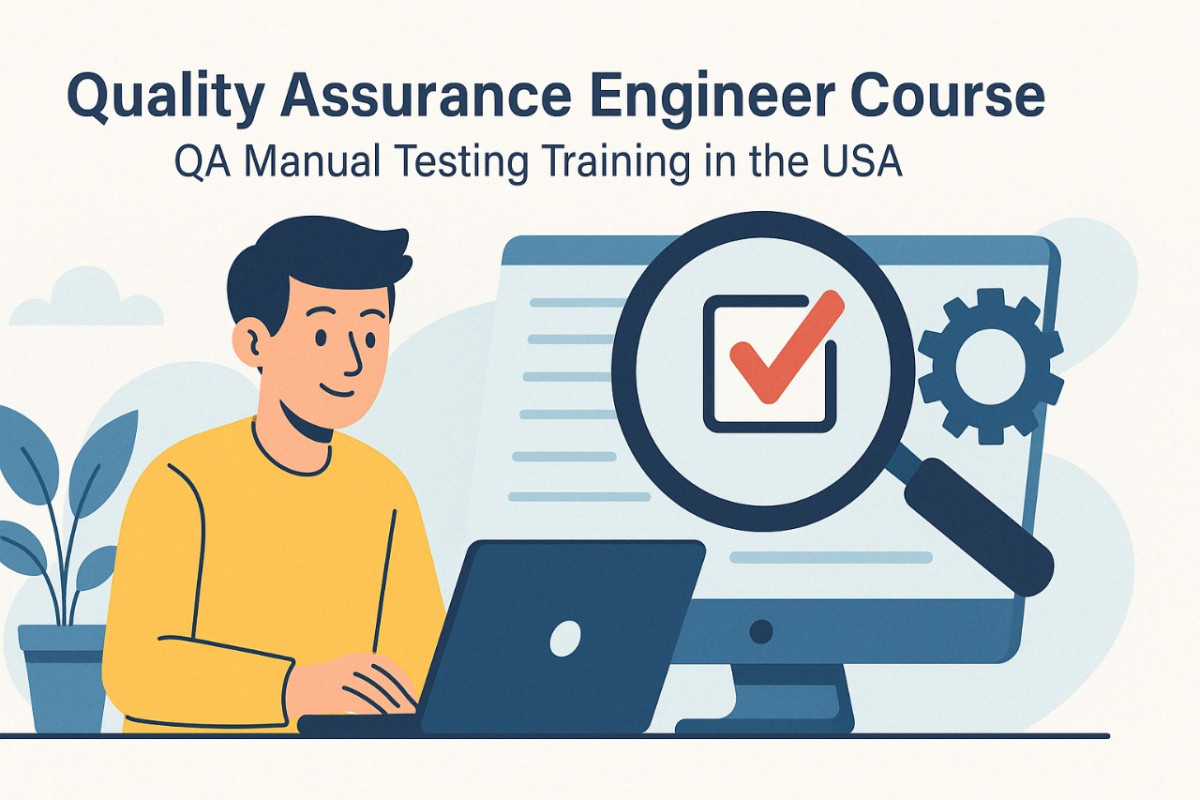- Apr 16, 2025
QA engineering careers start at $95,000+ annually, offering exceptional growth potential in the tech industry. The current market boasts 113,000+ junior-level positions nationwide, making QA engineer courses your gateway to a thriving tech career.
Strong market demand drives continuous growth for qualified QA professionals. Over 20,000 remote positions await skilled candidates, while success rates speak volumes - 87% of program graduates secure tech roles within six months. Even more impressive, 79% of students step into quality assurance positions just three months after completing their training.
Our QA training programs blend hands-on experience with industry-standard tools, preparing you for real-world challenges. Expert instructors guide you through practical scenarios while our dedicated placement team supports your journey into software quality assurance. Your path to a rewarding QA career starts here.
Understanding Quality Assurance Engineering Fundamentals
Software testing principles stand as the cornerstone of quality assurance engineering. The International Software Testing Qualifications Board (ISTQB) establishes these foundational guidelines for effective testing practices [22].
QA engineers excel at finding software defects while acknowledging that the complete absence of bugs remains impossible to prove [22]. Our focus stays on minimizing undiscovered defects through strategic testing approaches. Competent teams prioritize early testing phases, saving valuable time and resources by catching issues during initial development stages [22].
Essential testing principles guide successful QA practices:
- Testing reveals defects but cannot guarantee perfection
- Exhaustive testing is impractical except in simple cases
- Early testing reduces costly changes
- Defects tend to cluster in specific areas
- Tests need regular updates to maintain effectiveness
- Testing approaches vary by context
- Zero defects does not guarantee user satisfaction
Quality assurance thrives on proactive strategies rather than reactive fixes [23]. Expert QA engineers evaluate and troubleshoot software throughout development cycles, ensuring consistent quality standards [21]. Their responsibilities span quality requirement definition, test creation, and documentation maintenance [21].
QA excellence begins before the first line of code [20]. Skilled professionals partner with stakeholders during requirement analysis, offering design insights and maintaining quality across development and deployment phases [6]. Their watchful eyes monitor each development stage, recommending improvements from core functionality to feature enhancements [21].
Your QA engineering journey involves crafting test plans aligned with development methodologies, architecture patterns, and frameworks [6]. Strategic continuous testing paired with risk-based approaches helps you spot potential issues early, protecting project success [6].
Comprehensive QA Training Curriculum
Quality systems training programs build essential skills through proven learning paths [7]. Our expertly crafted QA curriculum guarantees mastery of core testing competencies while familiarizing you with industry-standard tools.
Manual Testing Techniques and Tools Manual testing skills remain crucial for uncovering user experience issues and early-stage defects [6]. Your hands-on practice sessions with BrowserStack Live and TestRail build real-world testing expertise. These powerful platforms let you test across multiple devices and browsers, giving you clear insights into application performance [6].
Test Case Design and Execution Strong test case design skills set exceptional QA professionals apart. Your test cases will cover:
- Test objectives and conditions
- Step-by-step environment setup
- Input data specifications
- Expected outcomes
- Version details
- Working environment parameters [9]
System testing expertise grows as you master both functional and non-functional requirement validation [9]. Your test execution abilities strengthen through hands-on practice, ensuring complete software coverage [10].
Defect Tracking and Reporting Systems Modern QA teams rely on robust defect tracking systems to manage software issues effectively [11]. Master industry-favorite platforms like JIRA and Bugzilla while learning to document, track, and analyze defects with precision [12]. These powerful tools foster seamless collaboration between development and testing teams through automated notifications and detailed analytics [11].
Our focus on continuous skill development helps explain why organizations with internal training programs achieve 90% employee retention [13]. Your learning journey combines engaging classroom sessions with practical workshops, adapting to your preferred learning style [13].
Practical Skills Development
Practical experience powers successful quality assurance training. Our hands-on projects help you master essential testing techniques while building an impressive portfolio of real-world applications [14].
Industry-standard QA tools power modern testing environments. Your training masters vital platforms - BrowserStack for cross-browser testing, TestRail for test case management, and JIRA for project tracking [12]. Strong programming skills in Python, Java, or JavaScript unlock your potential to create powerful automated test scripts [15].
Test automation excellence starts with building frameworks that drive efficient testing processes. Master the art of identifying high-value test cases, applying core principles, and executing strategic automation plans [16]. Your expertise grows as you harness leading automation tools like Selenium and Perfecto to streamline testing workflows [15].
Bug tracking mastery demands proficiency across diverse tools - from open-source solutions like BugZilla and Redmine to professional platforms like SpiraTest and YouTrack [12]. Success in defect tracking requires sharp technical skills. Your expertise will grow in:
- Accurate defect identification and reporting
- Issue prioritization based on severity
- Workflow management and collaboration
- Comprehensive analytics and reporting
Our practical training delivers results - 87% of graduates secure tech positions within six months [17]. Daily practice with industry tools sharpens your ability to detect and manage software defects [18]. This hands-on approach builds the technical expertise needed for quality assurance success [19].
Essential QA Testing Tools
Quality assurance success depends on powerful specialized tools that boost testing efficiency and accuracy. Smart QA professionals choose the right mix of test management platforms and automation tools to build strong testing foundations.
Test management platforms
QTest delivers robust test management capabilities, smoothly connecting with popular Agile and DevOps tools [20]. Teams love its organized test case management, defect tracking, and real-time dashboard insights. TestLink offers another strong choice, focusing on comprehensive test planning and tracking features [21].
Powerful test management platforms provide:
- Centralized test case organization and execution tracking
- Integration with development tools and bug trackers
- Customizable reporting and analytics
- Role-based access control for team collaboration
- Real-time progress monitoring
Automation tools introduction
Selenium leads the automation landscape, supporting multiple programming languages and browsers [22]. The newer Cypress platform brings modern features to web application testing, offering built-in debugging capabilities [22]. Both tools cut manual work while expanding test coverage and reliability.
TestComplete welcomes testers of all skill levels with script and scriptless options [23]. API testing becomes simpler with Postman's streamlined approach to development, testing, and documentation [21]. These powerful platforms help QA engineers build reliable test suites that maintain software quality across environments [20].
Career Advancement Opportunities
Quality assurance professionals enjoy exceptional financial rewards at every career stage. Entry-level QA positions begin at $58,090, while seasoned experts earn up to $139,100 annually [6]. Your earning potential grows further with average cash bonuses reaching $3,250 yearly [6].
QA engineer salary expectations
Top tech hubs reward QA talent generously. San Francisco leads with $105,424, while Chicago follows at $101,648 [6]. Nationwide, QA professionals earn between $89,890 and $119,771, including performance bonuses [6].
Career progression paths
Your QA career path offers clear advancement stages:
- Junior QA Analyst/Engineer ($63,915)
- QA Engineer ($89,890)
- Senior QA Engineer ($108,142)
- QA Lead/Manager ($137,000) [6]
Success in these roles opens doors to strategic positions like QA Director or VP of Quality, where you'll shape company-wide quality standards [24].
Remote work possibilities
QA professionals now enjoy unprecedented flexibility with 20,000+ remote positions nationwide [5]. These roles offer impressive compensation packages ranging from $57,890 to $185,000 annually [25]. Work from anywhere while maintaining competitive salary levels.
Live project participation
Real-world experience shapes successful QA careers. Our training programs deliver 400+ hours of hands-on education [26]. The results speak volumes - 79% of graduates step into QA roles within three months [26]. Expert mentors guide your journey through interview preparation and resume building workshops until you land your ideal position [5].
Real-World Project Experience
Your QA journey begins with hands-on experience in real projects. Expert QA professionals guide your growth from day one, leading industry-standard projects [27].
Industry collaboration opportunities
Join forces with our team of 40+ QA experts to master diverse testing approaches and industry-best practices [27]. Collaborative projects sharpen your skills in performance testing, accessibility evaluation, and automation implementation. Skilled mentors support your growth as you develop solutions for global brands [27].
Portfolio development
Showcase your QA expertise through a powerful portfolio of real testing achievements. Your portfolio should feature:
- Screenshots and videos of your testing prowess
- Well-documented test cases and bug reports
- Self-directed testing projects on web applications and APIs [28]
Make your mark by highlighting manual testing skills, API testing knowledge, and mastery of TestRail and Selenium [29]. Strong bug reports and detailed test case documentation boost your professional standing [28].
Resume building workshops
Our resume workshops teach you to present your QA expertise with impact. Expert guidance helps spotlight your skills and new certifications [30]. Your tailored resume opens doors to promising interview opportunities [31]. Learn to weave industry keywords into compelling cover letters that match essential QA requirements [31].
Workshop sessions show you how to showcase your command of test management platforms, defect tracking systems, and automation tools [31]. This strategic approach sets you apart in the competitive QA field [30].
Job Placement Support
QA career success demands strong interview skills and professional relationships. Our preparation programs build your confidence to shine in technical interviews [3].
Interview preparation techniques
Sharp technical skills grow through dedicated practice with Selenium, Puppeteer, Cypress, and Playwright [3]. Mock interviews teach you to present solutions clearly while handling tough scenarios with confidence [2]. Test Automation University supports your growth with practical code samples and skill-building assignments [3].
Winning interview strategies include:
- Solving real-world testing challenges
- Sharing powerful experience stories
- Mastering clear communication
- Building confidence through practice [3]
Network building strategies
Smart networking unlocks hidden opportunities - 85% of new roles come through professional connections [32]. Your success starts with industry meetups, QA clubs, and professional associations [32].
Build lasting relationships through active participation on LinkedIn, Indeed, and QA forums [1]. Partner with software recruiters to discover promising interview opportunities [1]. Regular follow-ups strengthen professional bonds and keep you informed about hiring progress [1].
Strong QA networks help you:
- Discover exciting opportunities
- Advance your career path
- Exchange testing insights
- Access learning resources
- Build industry credibility [32]
Remember, hiring managers often choose candidates they know and trust [1]. Active community involvement creates valuable connections that fuel long-term career growth [32].
Industry Certifications and Recognition
Professional certifications prove your QA expertise while opening doors to exceptional career opportunities. The ISTQB Foundation Level (CTFL) leads U.S. job requirements as the most requested certification [4]. This foundational certification unlocks access to advanced ISTQB credentials, building your professional journey [4].
Popular QA certifications
U.S. companies prize the ISTQB Agile Tester Certification as their second most valued credential [4]. The ISTQB Advanced Test Analyst Certification opens specialized career paths for ambitious professionals [4]. DevOps specialists benefit from the AT*SQA DevOps Testing Certification, offering direct entry without prerequisites [4].
Certification preparation guidance
Smart preparation strategies power certification success. Many professionals boost their results through study groups and team-based exam preparation [8]. Your success toolkit includes:
- Official certification study materials
- Practice tests and mock exams
- Training courses from accredited providers
- Professional study guides
Value of certifications in job market
Certified QA professionals earn more than their non-certified peers [33]. Top organizations seek certified talent, recognizing these credentials as proof of professional excellence [33]. Your name joins the Official List of Certified & Credentialed Software Testers, catching the eye of potential employers [4].
Certification success brings additional rewards. Many employers invest in your growth by covering certification costs [8]. AT*SQA participation earns valuable Testing Tiers® ranking points, elevating your professional standing [4]. These globally-recognized certifications unlock opportunities across international markets [33].
Conclusion
Quality Assurance engineering offers exceptional career rewards and growth potential. Top performers start at $95,000+ annually, advancing to $139,100 with experience. The booming market presents 113,000+ positions nationwide, welcoming skilled professionals.
Our professional QA training builds your expertise through hands-on mastery of Selenium, TestComplete, and JIRA. Your ISTQB certifications paired with practical skills set you apart in the competitive tech landscape. Our proven placement support propels 79% of graduates into QA roles within three months.
Clear career paths guide your growth from Junior QA positions to strategic leadership roles like QA Director. The surge in remote opportunities - now 20,000+ positions nationwide - adds flexibility to your career choices. Competitive salaries paired with work-life balance make QA engineering your ideal career path.
Ready to launch your QA engineering career? Join our comprehensive QA Engineer Course and master the skills that drive success in tech. Your future starts today - take the first step toward professional excellence.
QA engineering rewards dedicated professionals with stability, growth, and advancement opportunities. Our powerful combination of practical training, respected certifications, and dedicated placement support paves your path to technology sector success.


